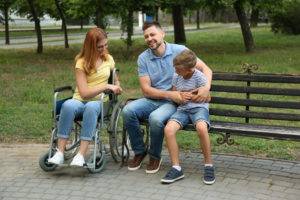When someone’s negligence results in another’s physical injuries, the injured party may be entitled to financial compensation for his or her medical bills, lost wages, and other direct damages. But these compensatory pain and suffering damages are often only a small part of the picture.
Non-economic damages are designed to help compensate a plaintiff for his or her “invisible injuries” – pain and suffering, mental anguish, and loss of capacity for the enjoyment of life. Learn more about who qualifies for these damages and when they can be recovered under Florida law.
What Are Non-Economic Damages?

This term encompasses pain and suffering, mental anguish, disability, physical impairment, inconvenience, aggravation of a disease or physical defect, and the loss of the capacity for the enjoyment of life. And in most Florida auto accident claims, a plaintiff must suffer a permanent physical injury to recover any non-economic pain and suffering damages.
Pain and Suffering Victim Damages
These Pain and Suffering can include, but are not limited to:
- Physical and mental pain and suffering. Specifics will vary, but this category includes the intangible costs associated with the pain of injury and recovery. You may deal with more aches and pains than you did before your accident, or be forced to change your daily routines to accommodate the reality of your injury.
- Emotional distress. Plaintiffs who must deal with the aftermath of an injury can develop post-traumatic stress disorder (PTSD), anxiety, depression, and other mental health disorders. In some situations, emotional distress damages may also be available to the spouse or parent who witnessed their loved one’s injury.
- Temporary or permanent disability. Any injury (including an emotional injury) that limits the activities you can perform can be considered disabling. If your future earning capacity is reduced as the result of another person’s negligence, you’re entitled to be put in a similar financial position as the one you could have achieved had you not been injured.
- Permanent physical disfigurement. A physical disfigurement can impact both your physical and emotional health. You may be reluctant to leave the house for fear of unwanted attention or depressed that you can no longer participate in activities you once enjoyed.
- Potential shortening of life. Some physical disabilities can statistically shorten your lifespan or make you more vulnerable to long-term complications.
Punitive Damages
Need free legal help in Florida?
We specialize in personal injury claims.

Unlike compensatory pain and suffering damages, punitive damages aren’t designed to compensate an injured plaintiff for what her or she has lost. Instead, these damages are intended to punish the defendant for egregiously negligent or reckless behavior.
The threshold for awarding punitive damages in Florida is a high one. The judge or jury hearing the claim must be convinced that the defendant’s negligence rose to the level of “gross negligence.” Some recent cases in which punitive damages have been awarded include:
- A yacht worker whose emergency hernia surgery coverage was denied by his employer while he was at port in Cuba. This plaintiff received $1 million in punitive damages.
- The surviving spouse of a lung cancer victim received $148 million in punitive damages (and 8 million in compensatory damages) from Philip Morris.
Who Can Recover Non-Economic Pain and Suffering Damages in a Personal Injury?
Non-economic pain and suffering can be recovered by plaintiffs and, in some cases, their immediate family members who are directly impacted by the accident and injury. The amount and type of non-economic pain and suffering damages available will vary based on many factors, including:
- Whether the injury and any resulting disability or disfigurement is temporary or permanent;
- The age and health of the plaintiff at the time of the accident;
- The extent to which the injury impacts the plaintiff’s daily life, employability, and relationships;
- The plaintiff’s ability to meet their future physical and mental health needs without extra help; and
- The defendant’s available assets and insurance policy limits.
While non-economic pain and suffering damages related to pain and suffering and emotional distress may have some connection to the actual costs a plaintiff incurred, punitive damages are far less limited. In many cases in which punitive damages are awarded, including the Philip Morris case, they significantly exceed the amount awarded in compensatory pain and suffering.
Seeking Help From A Lawyer
A personal injury attorney can help you assess which route is best for you, depending on your individual case. Andrew Pickett Law has the trial experience and connections to medical resources on hand, so you can rest assured knowing you’re on your way to financial and emotional recovery after pain and suffering in a personal injury case.
Need free legal help in Florida?
We specialize in personal injury claims.






